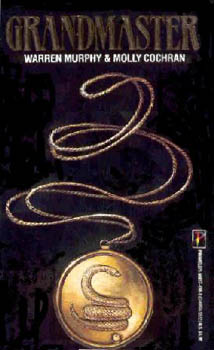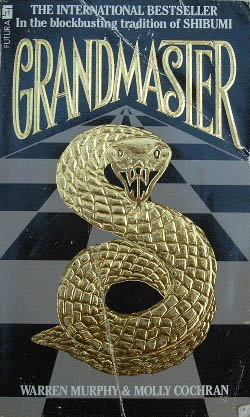|
Murphy/Cochran: Grandmaster
A married couple of writers called Murphy
and Cochrane – already in name close to grand-master
level chess – may perhaps feel impelled by fate
to write a book such as "Grandmaster”. It
reads as if it were inspired by the minds of the great
masters - mystical, literary and chess masters. The
book itself is a masterpiece.
Justin Gilead and Zharkow first meet
as ten-year-olds in a prestigious duel between chess
prodigies, one as a representative of the West the other
of the East. They are like polarized twins, closely
complementing each other: all their later actions will
constantly be directed at destroying each other and
as a result themselves. Both go a long way in preparation
for the final encounter; Gilead turns out to be a reincarnation
of Patanjali, filled with the spirit of Brahman and
after Indian monks search for him for ten ears, he is
found and brought up in the secret and holy place of
Rashimpur, in order to learn everything which is possible
to learn to accomplish superhuman deeds as the revered
and long-desired "Wearer of the Blue Hat”.
Zharkov in contrast is the foster child of the antagonistic
goddess of the darkness, and be-comes the "Prince
of Death”. Both are trained to fight the battle
of all battles. Zharkov will later become the feared
supremo of "Nichevo”, a Soviet Russian Secret
Service which acts in accordance with Stalinist legacy
and is even feared by the KGB, whilst Gilead enters
into the service of the CIA in order to combat Nichevo.
Whenever he appears at international chess tournaments,
not only does he achieve outstanding results, but also
Russian agents mysteri-ously die there. People call
him the "Grandmaster” only out of respect.
The scenes of these historical battles, unknown to all
official historical accounts, are Tibet, Poland, Moscow,
Ber-lin and Havana. The fight rages on, up and down,
both parties have to swallow the bitter pill of defeat,
Rashimpur is destroyed, and with it the paternal monks.
People with whom Gilead comes into contact drop like
flies, indeed even he twice seems to be finished, and
rises again.
Eventually it boils down to a big showdown
in Cuba. In a memorable chess tournament, all the strands
of the plot are brought together, Nichevo intend to
murder Castro, and the CIA wants the Soviet world champion
to flee to the West.

In this review, where we are obliged
to concentrate on the chess mind, detailed analysis
of content and structure must be dispensed with; the
novel is too vibrant for that. This incredibly lively
and ever-exciting book presents a patchwork of spy novel,
political thriller and crime story, of the spirituality
of the Far East and New Age wisdom and also of folk-tales
and myth. It is instructive, shrewdly and speedily written;
in every line, it reveals the professionalism of its
creators: in short, it is highly complex, even if the
main conflict is characterized by the simplest duality,
or more precisely, a mixture of simplicity and complexity,
in a way which can perhaps be nowhere better symbolized
than in chess.
That does not mean that the vocabulary
of the Cold War does not have an alienating and over-simplifying
effect, especially on today’s reader, nor that
much of it is over-exaggerated or simply meaningless
fantasy. Perhaps the entire plot of the book is nonsense,
but this can be compared with modern dietary habits:
we swallow rubbish daily, as long as it is tasty and
well-packaged. That is the secret behind the effect
of this book.
In the field of chess literature, the
work deserves pride of place, because it, unlike almost
all others, including the classics, succeeds in combining
the wisdom and inner tension of the game. That extends
from Gilead´s "I am the game” to Zharkov´s
"Nichevo is chess” via the notorious "flow”
– "an inexplicable release in the mind of
the player, when the game seemed to work itself automatically,
without conscious thought"- or from imaginatively
described over the board clashes, which read like a
perfect crime story, and are in fact nothing other than
this, from tension-charged dramas in tournaments to
many wise insights into the game. Anyone who, having
read the book, still does not feel like playing or learning
chess on reading the book can no longer be let in on
our great secret. Seen in this way, "Grandmaster”
presents the most intense advertisement for chess that
can be imagined, and is easily equal to dozens of theory
books in terms of inspiring motivation.
It is of even more importance that chess
is not misused as the means to an end, as is so often
the case in literature, but serves as a universal metaphor
with a potential for world-enlightenment. What happens
over more than 400 pages is chess. This unheard-of elevation
has here enjoyed credible success, as it symbolises
a conflict of systems, which we mostly interpret as
political antagonism: East vs. West, Red vs. Black,
Black vs. White. But this only represents a reappearance
of the eternal; one might say Heraclitean conflict.
Through this, over-interpretation demands new plausibility
and genuine metaphysical depth, insofar as an-cient
powers stand directly opposed to each other, which then
become a dialectical model of explanation. Metaphysical
here means mythical. The use of chess metaphors is not
artificial, it is essential, where it is not important,
whether the story is fictitious or even nonsensical.
Therefore this novel stands out from the flood of chess
literature.

Warren Murphy/Molly Cochran: Grandmaster.
London 1984. 428 p
Warren Murphy/Molly Cochran: High Priest (Grandmaster
II).
--- Jörg Seidel, 25.11.2003 ---
Dieser Text ist geistiges Eigentum von
Jörg Seidel und darf ohne seine schriftliche Zustimmung
in keiner Form vervielfältigt oder weiter verwendet
werden. Der Autor behält sich alle Rechte vor.
Bitte beachten Sie dazu auch unseren Haftungsausschluss.
|
|

